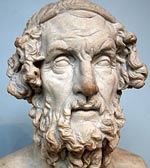Homer Biography
Homer (c. 850 BC) Classical Greek poet. Author of the Iliad and the Odyssey
 Through his epic poems, Homer has played a hugely influential role in Western Literature. His classics of the Iliad and the Odyssey, stand at the forefront of the Western Canon of literature.
Through his epic poems, Homer has played a hugely influential role in Western Literature. His classics of the Iliad and the Odyssey, stand at the forefront of the Western Canon of literature.
Details about the life of Homer are scarce and different sources quote different variations about his life. The historian Herodotus places Homer as living around 850BC. However, other sources suggest Homer was born around the time of the Trojan war in the early 12 Century BC.
The name Homer has been interpreted as meaning ‘he who accompanies, he who is forced to follow.’ or in some dialects ‘blind’. This has led to the opinion that Homer may have been blind.
Homer is said to have been born on the Greek island of Chios or perhaps Ionia. Homer was likely to have been a fairly aristocratic member of court – perhaps working as a court minstrel or story teller.
Despite the length of the Iliad and the Odyssey, it is likely that at least part of these epics were initially memorised orally. In antiquity, there was a strong tradition of poems being memorised by professional story tellers. The two epics are amongst the earliest works to be written down and saved for posterity. At the time of the 8th Century BC, the Greek alphabet was just being introduced and writing was a new skill, that many didn’t posses.
There is debate about whether the person ‘Homer’ wrote both epics. Some argue that the works may have been produced by various people with the name ‘Homer’ added for convenience. However, other academics do maintain that both epics were written by the one person – Homer.
Homer is credited with a range of poems, including the entire Epic Cycle and the Homeric Hymns. However, it is for his heroic epics – the Iliad and the Odyssey, written in hexameter verse that he is best remembered.
The Iliad depicts the siege of Ilion or Troy during the last year of the Trojan War. The Iliaddescribes how eventually the city of Troy was captured after the cunning use of the ‘Trojan Horse’ – a gift from the Greeks to Troy, which actually contained a detachments of soldiers – who once brought through the impregnable gates sacked the city. The Iliad places great emphasis on the intervention of the Gods. At times it appears, the men are instruments of fate and the decrees of the Higher Powers. In the Iliad, religious devotion and moral conduct play a key role.
“Everything is more beautiful
because we’re doomed.
You will never be lovelier than you are now.
We will never be here again.”
— Homer (The Iliad)
The Odyssey concerns the travels the Greek character Odysseus and his family on his journey back from the Trojan war. As well as Odysseus’ eventful travels back home. It also deals with how Odysseus’ wife Penelope has to deal with suitors seeking to marry her in Odysseus’ absence. The Odyssey was ground-breaking for placing equal emphasis on the role of women and civilians as on warriors.
“Now from his breast into the eyes the ache
of longing mounted, and he wept at last,
his dear wife, clear and faithful, in his arms,
longed for as the sunwarmed earth is longed for by a swimmer
spent in rough water where his ship went down
under Poseidon’s blows, gale winds and tons of sea.
Homer, The Odyssey
The Iliad and to a lesser extent the Odyssey have received prolonged acclaim for their unique and powerfully written style. In particular, Homer is praised for his simplicity, directness and nobleness.
“(the) four qualities of (Homer):—that he is eminently rapid; that he is eminently plain and direct, both in the evolution of his thought and in the expression of it, that is, both in his syntax and in his words; that he is eminently plain and direct in the substance of his thought, that is, in his matter and ideas; and finally, that he is eminently noble.”
– Matthew Arnold.
Another key feature of Homer’s epics is that he is primarily concerned with the individual human drama and emotion. He isn’t concerned with the political and religious ideologies of his time. For this, Homer’s work are often referred to as ‘dramas’.



No comments:
Post a Comment